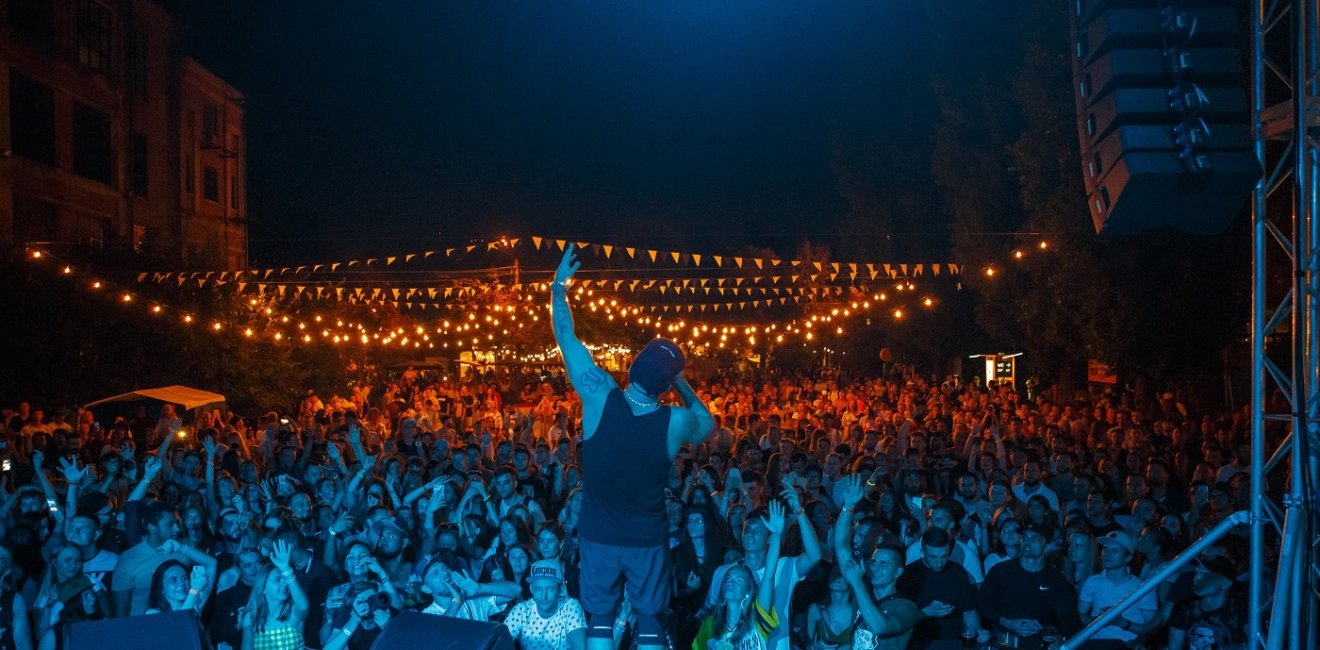
A blog of the Kennan Institute
The Russian full-scale invasion of Ukraine in 2022 prompted Ukrainian rapper Skofka (Volodvymyr Samolyuk) to write songs giving voice to his generation’s anger and sorrow. His profanity-infused wartime song “Don’t Forget and Don’t Forgive” (“Ne zabudem i ne probachim”) excoriates those who speak of building bridges while burning them down instead. The song’s last lines—“Guess that's how it feels when you fear everything / I guess I'm done”—captured the sense of betrayal felt by many Ukrainians of his generation when the Russians launched their invasion.
Later in 2022, Skofka released “Hear the Anthem” (“Chuty himn”), dedicated to his friend Valentyn Konovodov, who died in the fighting. The singer’s anger had turned into resolve by the time he composed this second tune, and his voice extended beyond any one generation to reach all Ukrainians. Charting the destruction inflicted on towns and cities across the country in a determined and unblemished voice, Skofka returns to the powerful refrain, “In a clear sky thunder's heard / In the sky's a whistle, but the hymn is heard! / In a clear sky there is dense smoke / Mountains sputter, but the hymn is heard!”
“Hear the Anthem” has become an anthem itself for wartime Ukraine, viewed on YouTube more than 10 million times. The piece has been used at times of personal reflection and of communal gatherings. It has been sung by soldiers at the front, and by those at home who have lost too much to recover their former lives. It has become the background to film and television reporting on the war and has empowered thousands of individual Ukrainians to find inner strength they did not know they had.
The now 30-year-old Ukrainian rapper was enjoying a rising career when the war started, with nearly half a million followers on Spotify. He began recording in 2017 and kept gathering fans throughout Ukraine. In 2021, he joined with Kalysh Band leader Oleh Psiuk to record “Dodomu.” Several collaborations followed, which were hits on Shazam, Spotify, and iTunes. By year’s end, he had signed on with the ENKO label.
Like many of his generation, Skofka had turned to rap to tell his own story and those of his friends. Born in the western provincial city Rivne, he initially pursued rap as a hobby (much to the chagrin of his police officer father). He trundled off to college, after graduating from Zbolbuniv School No. 6 to study business and marketing at a local branch of the Kyiv Slavonic University. Commodity research and the ins and outs of commerce, however, failed to hold his attention. He preferred, instead, to experiment with new sounds and images which told stories of social consequences. Forays into the world of rap prepared him for powerfully articulating the hopes, fears, anger, and sorrow of his compatriots once the war began.
He’s travelled abroad to share these feelings recently, with a 15-city North American tour. In February and March, he raised tens of thousands of dollars for the Ukrainian defense effort with shows in Seattle, Cleveland, San Francisco, Los Angeles, Chicago, Miami, Philadelphia, New York, Toronto, Vancouver, and a handful of other cities.
American audiences turned out in the hundreds at venues that wanted to demonstrate continued support for Ukraine. His concerts included both fans connected with Ukraine and those who simply love rap. For those already familiar with his songs, the tour provided a welcome opportunity to hear Skofka in person. Others were taken with his poetry and with songs unrelated to the war. Whether knowing Ukrainian or not, fans resonated with the emotions unleashed by “Don’t Forget and Don’t Forgive.”
Ukrainian youth culture has signaled deep transformations within the country since independence more than three decades ago. Musicians have voiced a growing identification with and commitment to Ukraine that transcends regional, linguistic, and ethnic divisions. Their popularity reflects a reality not always apparent in the country’s politics. Ukraine is one country with a shared culture, Skofka says, with a story of resilience, resistance, and resolve. It’s also a country that will neither forget nor forgive.
The opinions expressed in this article are those solely of the author and do not reflect the views of the Kennan Institute.
Author

Former Wilson Center Vice President for Programs (2014-2017); Director of the Comparative Urban Studies Program/Urban Sustainability Laboratory (1992-2017); Director of the Kennan Institute for Advanced Russian Studies (1989-2012) and Director of the Program on Global Sustainability and Resilience (2012-2014)

Kennan Institute
After more than 50 years as a vital part of the Wilson Center legacy, the Kennan Institute has become an independent think tank. You can find the current website for the Kennan Institute at kennaninstitute.org. Please look for future announcements about partnership activities between the Wilson Center and the Kennan Institute at Wilson Center Press Room. The Kennan Institute is the premier US center for advanced research on Eurasia and the oldest and largest regional program at the Woodrow Wilson International Center for Scholars. The Kennan Institute is committed to improving American understanding of Russia, Ukraine, Central Asia, the South Caucasus, and the surrounding region through research and exchange. Read more

Explore More in Focus Ukraine
Browse Focus Ukraine
Talking to the Dead to Heal the Living

Ukrainian Issue in Polish Elections


